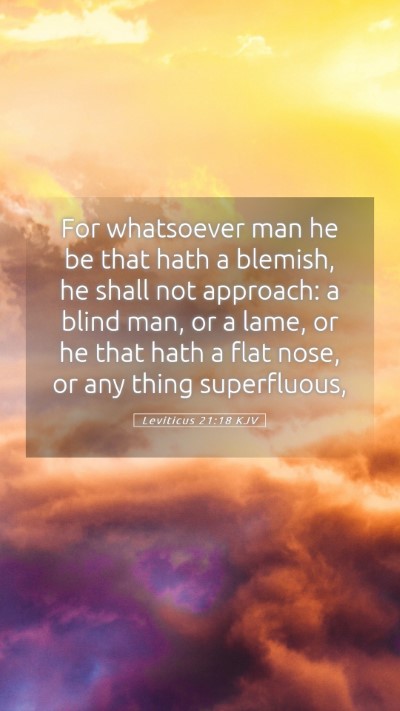Bible Verse Commentary: Leviticus 21:18
Verse Context: Leviticus 21:18 states, "For any man who has a defect shall not approach: a blind man or a lame man, or he who has a marred face or any limb too long." This verse is part of the laws governing the conduct of priests and their fitness to serve in the sanctuary.
Understanding the Requirements
The verse addresses the physical qualifications required for priests serving in the tabernacle. Matthew Henry emphasizes that these stipulations underline the holiness required for those who approach God in worship. The priest’s bodily integrity symbolizes spiritual wholeness, illustrating the need for purity and perfection in serving the Divine.
Albert Barnes further explains that these regulations were meant to ensure that those ministering to God were without physical defect, which represented both a physical and spiritual standard. The significance of this goes beyond the physical attributes; it reflects an underlying principle of wholeness and readiness to serve God.
According to Adam Clarke, such restrictions were necessary for the ceremonial law and the culture of separation that characterized Old Testament worship. Those with physical imperfections were not to approach the altar, signifying a symbolic protection of God’s holiness.
Spiritual Interpretation and Modern Application
While these physical expectations may seem outdated, the spiritual implications endure. The concept of approaching God requires a heart free from moral and spiritual defects. Matthew Henry draws attention to the internal condition of the heart as the true matter of concern when it comes to worship. This leads to a broader interpretation of Bible verses, connecting the physical and spiritual realms.
Albert Barnes suggests that understanding this verse requires recognition that God values inner purity over outward appearances, echoing New Testament themes where Jesus condemns the pharisaical emphasis on external rituals while neglecting inner holiness.
Cross-References
- Exodus 28:1 - Instructions for the priests’ consecration.
- Numbers 3:10 - Duties and responsibilities of the Levite priests.
- Hebrews 10:14 - Christ’s one-time offering perfects those who are being sanctified.
- 1 Peter 2:9 - Believers are a royal priesthood, called to holiness.
Conclusion
In conclusion, Leviticus 21:18 serves as a powerful reminder of God’s holiness and standards for His servants. Through careful Biblical exegesis, one can see that while the clear admonitions reference physical conditions, the deeper message is about spiritual readiness. As today’s believers engage with Bible study resources, they are reminded of the need to reflect inwardly, ensuring that their hearts and lives are aligned with God’s call.
This understanding encourages individual reflection and application, guiding one towards a more meaningful engagement with Scripture and personal faith.


